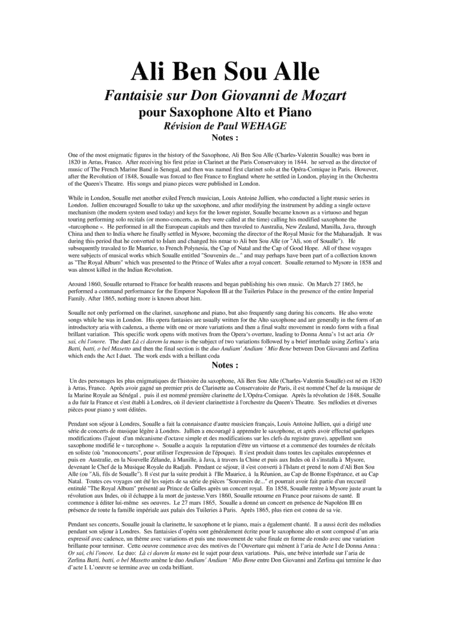Alto Saxophone,Piano - Level 3 - Digital Download SKU: A0.533347 Composed by Ali Ben Sou Alle, Wolfgang Amadeus Mozart. Arranged by Paul Wehage. Concert,Opera,Romantic Period,Standards. Score and part. 22 pages. Musik Fabrik Music Publishing #2348197. Published by Musik Fabrik Music Publishing (A0.533347). One of the most enigmatic figures in the history of the Saxophone, Ali Ben Sou Alle (Charles-Valentin Soualle) was born in 1820 in Arras, France. After receiving his first prize in Clarinet at the Paris Conservatory in 1844. he served as the director ofmusic of The French Marine Band in Senegal, and then was named first clarinet solo at the Opéra-Comique in Paris. However, after the Revolution of 1848, Soualle was forced to flee France to England where he settled in London, playing in the Orchestra of the Queen's Theatre. His songs and piano pieces were published in London. While in London, Soualle met another exiled French musician, Louis Antoine Jullien, who conducted a light music series in London. Jullien encouraged Soualle to take up the saxophone, and after modifying the instrument by adding a single octave mechanism (the modern system used today) and keys for the lower register, Soualle became known as a virtuoso and began touring performing solo recitals (or mono-concerts, as they were called at the time) calling his modified saxophone the «turcophone ». He performed in all the European capitals and then traveled to Australia, New Zealand, Manilla, Java, through China and then to India where he finally settled in Mysore, becoming the director of the Royal Music for the Maharadjah. It was during this period that he converted to Islam and changed his nmae to Ali ben Sou Alle (or Ali, son of Soualle). He subsequently travaled to Ile Maurice, to French Polynesia, the Cap of Natal and the Cap of Good Hope. All of these voyages were subjects of musical works which Soualle entitled Souvenirs de... and may perhaps have been part of a collection known as The Royal Album which was presented to the Prince of Wales after a royal concert. Soualle returned to Mysore in 1858 and was almost killed in the Indian Revolution. Around 1860, Soualle returned to France for health reasons and began publishing his own music. On March 27 1865, he performed a command performance for the Emperor Napoleon III at the Tuileries Palace in the presence of the entire Imperial Family. After 1865, nothing more is known about him. Soualle not only performed on the clarinet, saxophone and piano, but also frequently sang during his concerts. He also wrote songs while he was in London. His opera fantasies are usually written for the Alto saxophone and are generally in the form of an introductory aria with cadenza, a theme with one or more variations and then a final waltz movement in rondo form with a final brillant variation. This specific work opens with motives from the Operaâs overture, leading to Donna Annaâs 1st act aria Or sai, chi l'onore. The duet Là ci darem la mano is the subject of two variations followed by a brief interlude using Zerlinaâs aria Batti, batti, o bel Masetto and then the final section is the duo Andiamâ Andiam â Mio Bene between Don Giovanni and Zerlina which ends the Act I duet. The work ends with a brillant coda
